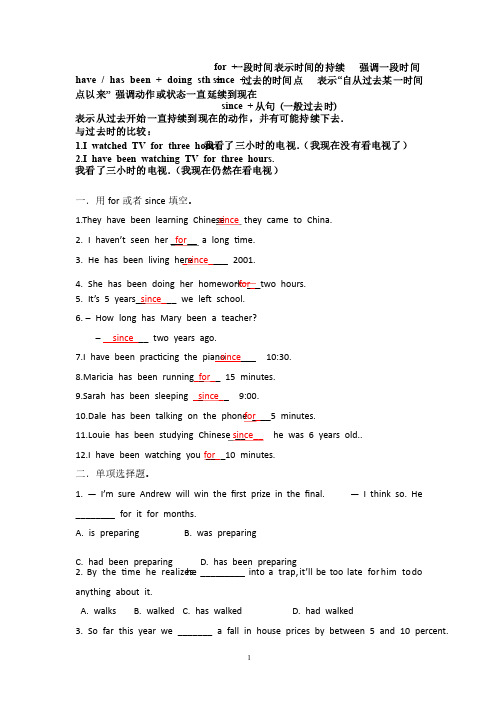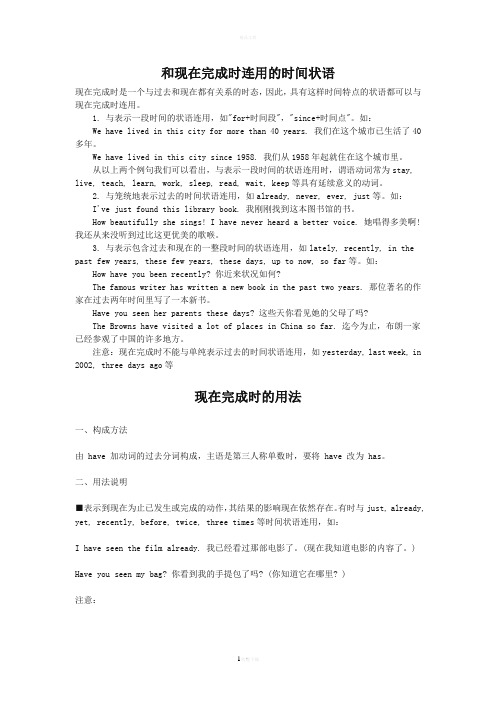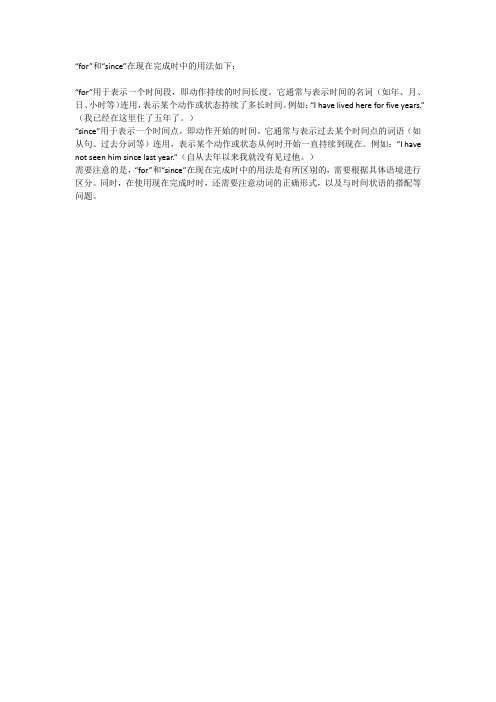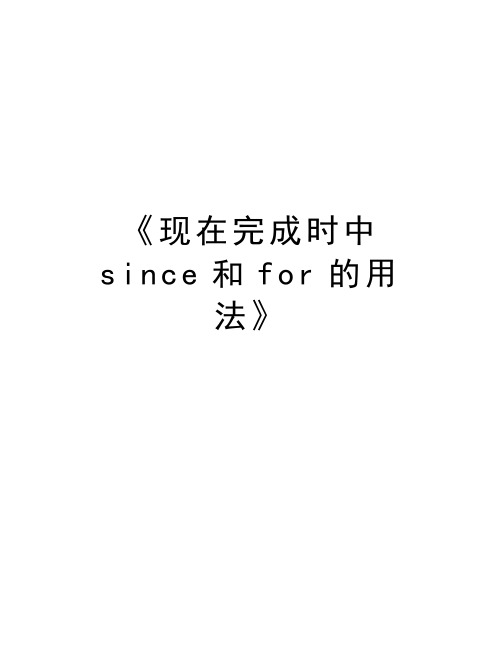用于现在完成时的since和for
现在完成时以及for,since的用法

for +一段时间表示时间的持续 强调一段时间 have / has been + doing sth + since +过去的时间点 表示“自从过去某一时间 点以来” 强调动作或状态一直延续到现在 since + 从句 (一般过去时) 表示从过去开始一直持续到现在的动作,并有可能持续下去.与过去时的比较:1.I watched TV for three hours.我看了三小时的电视.(我现在没有看电视了)2.I have been watching TV for three hours. 我看了三小时的电视.(我现在仍然在看电视)一.用for 或者since 填空。
填空。
1.They have been learning Chinese since they came to China. 2. I haven’t seen her ___for __ a long me. 3. He has been living here _since____ 2001. 4. She has been doing her homework __for__two hours. 5. It’s 5 years __since___ we le school. 6. – How long has Mary been a teacher? – __since___ two years ago. 7.I have been prac cing the piano _since ___ 10:30. 8.Maricia has been running __for__ 15 minutes. 9.Sarah has been sleeping ___since__ 9:00. 10.Dale has been talking on the phone __for___5 minutes. 11.Louie has been studying Chinese __since__ he was 6 years old.. 12.I have been watching you __for__10 minutes. 二.单项选择题。
英语 现在完成时Since和for的用法

现在完成时Since和for的用法Since 和for 的用法表示过去已经开始持续到现在的动作或状态常用的时间状语有:for, since, how long, so far, these days等。
Since+过去点的时间,for+一段时间(数词+量词),此划线部分用how long提问。
一、since短语或从句表示过去的动作延续至今,since之后的时间为一点。
如:Mr. Smith has worked here since 1984. 1984年以来,史密斯先生一直在这工作。
He’s learned about 5,000 English words since he went to college. 他上大学以来大约学了五千个英语单词。
二、for短语表示动作延续多长时间,for的宾语为时间段。
如:We have known each other for twenty years. 我们认识有二十年了。
I haven’t seen her for a long time. 我好久没有见到她了。
练习:用since和for填空1) ______ two years 2) _______ two years ago 3) _______ last month4) ______ 1999 5) _______ yesterday 6) _______ 4 o’clock7) ______ 4 hours 8) _______ an hour ago 9) _______ we were children10) _____ lunch time 11) ______ she left here1. He has lived in Nanjing ________ the year before last.2. I’ve known him __________ we were children.3. Our teacher has studied Japanese _________ three years.4. She has been away from the city ___________ about ten years.5. It’s about ten years __________she left the city.2.短暂性转换延续性①arrive at/in sw. get to/reach sw. come/go/move to sw.→ be in sw./at school/at home/on the farm/be here/be there1) He got to Beijing five minutes ago.He ________ _________ _________ Beijing for _________ _________.2) I moved to the USA last year.I ________ ________ __________ the USA since __________ __________.3) I went home yesterday.I _______ ________ _________ home for _________ __________.4) They came here last week.They _________ _________ here since _________ __________.②come/go back, return → be back come/go out → be out1) He came out two years ago.He _________ __________ _________ for __________ __________.2) We return to Fuzhou yesterday.We ________ ________ _________ to Fuzhou since __________.③become → be1) I became a teacher in 2000.I ________ __________ a teacher for _________ _________.2) The river became dirty last year.The river _________ _________ dirty for _________ __________.④close → be closed open → be open1) The shop closed two hours ago.The shop ________ _________ _________ for _________ _________.2) The door opened at six in the morning.The door ________ ________ ________ for six hours.⑤get up → be up die → be deadleave sw. → be away from sw.fall asleep/get tot sleep → be asleepfinish/end → be over marry → be married1) I got up two hours ago.I ________ ________ ________ since ________ ________.2) He left Fuzhou just now.He _______ ________ ________ _________ Fuzhou for five minutes.3) My grandpa died in 2002.My grandpa _______ _______ ________for _______ ________.4) The meeting finished at six.The meeting ________ ______ ______ for six hours.5) I got to sleep two hours ago.I ________ _________ _________ since _________ __________.6) They married in 1990.They ________ _________ __________since _________.⑥start/begin to do sth. → do sth. begin → be on1) I began to teach at this school in 1995.I ____ ____ at this school since ____.2) The film began two minutes ago.The film ____ ____ ____ for ____ ____.⑦borrow → keep lose → not have buy → have put on → wearcatch/get a cold → have a cold get to know → know1) They borrowed it last week.They _________ _________ it since __________ __________.2) I bought a pen two hours ago.I _________ _________ a pen for ________ __________.3) I got to know him last year.I _________ __________ him since __________ __________.4) I put on my glasses three years ago.I __________ __________ my glasses for _________ _________.⑧have/has gone to → have been in1) He has gone to Beijing.He ____ ____ _____ Beijing for two days.⑨join the league/the Party/the army→ be a league/a Party member/a soldier→ be a membe r of the league/the Party→ be in the league/the Party/the army1) He joined the league in 2002.He ________ _________ a _________ _________ for two years.He ________ __________ a __________ ___________ the __________ for two years.He ____________ ___________ ___________ the league for two years.2) My brother joined the army two years ago.My brother __________ __________ a ___________ for ___________ ___________. My brother ___________ ___________ in ____________ ___________ for two years.3.汉译英1)这本字典我已买了三年了。
现在完成时中的since与for

现在完成时中的since与forSince 用来说明动作起始时间,for用来说明动作延续时间长度。
I have lived here for more than twenty years.I have lived here since I was born..My aunt has worked in a clinic since 1949.Some new oilfields have been opened up since 1976.I have known Xiao Li since she was a little girl.My brother has been in the Youth League for two years.I have not heard from my uncle for a long time.注意:并非有for 作为时间状语的句子都用现在完成时。
I worked here for more than twenty years.(我现在已不在这里工作。
)I have worked here for many years.(现在我仍在这里工作。
)小窍门:当现在完成时+一段时间,这一结构中,我们用下面的公式转化,很容易就能排除非延续动词在完成时中的误使。
1)(对) Tom has studied Russian for three years.= Tom began to study Russian three years ago, and is still studying it now.2)(错) Harry has got married for six years.= Harry began to get married six years ago, and is still getting married now.显然,第二句不对,它应改为 Harry got married six years ago.或 Harry has been married for six years.。
和现在完成时连用的时间状语

和现在完成时连用的时间状语现在完成时是一个与过去和现在都有关系的时态,因此,具有这样时间特点的状语都可以与现在完成时连用。
1. 与表示一段时间的状语连用,如"for+时间段","since+时间点"。
如:We have lived in this city for more than 40 years. 我们在这个城市已生活了40多年。
We have lived in this city since 1958. 我们从1958年起就住在这个城市里。
从以上两个例句我们可以看出,与表示一段时间的状语连用时,谓语动词常为stay, live, teach, learn, work, sleep, read, wait, keep等具有延续意义的动词。
2. 与笼统地表示过去的时间状语连用,如already, never, ever, just等。
如:I've just found this library book. 我刚刚找到这本图书馆的书。
How beautifully she sings! I have never heard a better voice. 她唱得多美啊!我还从来没听到过比这更优美的歌喉。
3. 与表示包含过去和现在的一整段时间的状语连用,如lately, recently, in the past few years, these few years, these days, up to now, so far等。
如:How have you been recently? 你近来状况如何?The famous writer has written a new book in the past two years. 那位著名的作家在过去两年时间里写了一本新书。
Have you seen her parents these days? 这些天你看见她的父母了吗?The Browns have visited a lot of places in China so far. 迄今为止,布朗一家已经参观了中国的许多地方。
for和since现在完成时的用法

“for”和“since”在现在完成时中的用法如下:
“for”用于表示一个时间段,即动作持续的时间长度。
它通常与表示时间的名词(如年、月、日、小时等)连用,表示某个动作或状态持续了多长时间。
例如:“I have lived here for five years.”(我已经在这里住了五年了。
)
“since”用于表示一个时间点,即动作开始的时间。
它通常与表示过去某个时间点的词语(如从句、过去分词等)连用,表示某个动作或状态从何时开始一直持续到现在。
例如:“I have not seen him since last year.”(自从去年以来我就没有见过他。
)
需要注意的是,“for”和“since”在现在完成时中的用法是有所区别的,需要根据具体语境进行区分。
同时,在使用现在完成时时,还需要注意动词的正确形式,以及与时间状语的搭配等问题。
现在完成时for 和since用法

现在完成时二用法:过去完成时表示过去发生的动作或存在的状态一直持续到现在(包括现在在内),常与for和since引导的时间状语连用,动词需要用延续性动词。
如:Mr.Green has been in China for 10 years .(格林先生来中国10年了)The film has been on for 20 minutes.(电影开始已经20分钟了)Since 与for的区别:for后面跟一段时间如:for three days for 2 years 等+ 过去的时间点:since 2004Since+ 一段时间ago :since two minutes ago+ 过去时的句子:since I came to this school用since 和for 填空:1.I have kept the book _______ a week , I must return it on time .2.We have learned English _______ 5 years ago, so we have learned it ______ 5 years.3.Miss Li has taught maths ________ she came to this school ..4.I have had a cold _______ yesterday.5.The workers have worked _______ 10 hours . They are very tired.6.Great changes have taken place in China ______ it was founded.7.Our teacher has studied Japanese ______ three years.8. She has been away from the city ______ about ten years.9.. It’s about ten years __________ she left the city.短暂性动词的完成时态不能和表示一段的时间状语连用,当它需要与表示一段时间的时间状语连用时,通常需进行转化,见书119页。
【初中英语】初中英语语法since和for用法讲解

【初中英语】初中英语语法since和for用法讲解
【—语法since和for用法讲解r】大家在学习英语时,有很多的词表示同一个意思但是用法有很大的区别哦,今天老师就来为大家讲解一下since和for的用法,希望对大家有所帮助。
比较自始至终
since用来说明动作起始时间,for用来说明动作延续时间长度。
例如:我已经活了二十多年了。
我在这里住了二十多年了。
ihavelivedheresinceiwasborn.我从出生起就住在这儿了。
注:并非所有以for作为时间状语的句子都使用现在完成时。
iworkedhereformorethantwentyyears.(我现在已不在这里工作。
)
我在这里工作了好几年。
我现在还在这里工作
注意:用句型转换的方法,很容易排除非延续动词在有for/since结构的完成时中的误用。
1)汤姆学习俄语已经三年了,三年前开始学习俄语,现在仍在学习。
2)(错)harryhasgotmarriedforsixyears.=harrybegantogetmarriedsixyearsago,andisst illgettingmarriednow.
显然,第二句是错的。
它应该改为Harry GOTM arriedsix YearsGo或Harry Hasbeen HarriedSix Years
同学们,看看since和for的用法比较,大家有没有清楚一点呀,多多看看哦。
《现在完成时中since和for的用法》知识讲解

《现在完成时中s i n c e和f o r的用法》《现在完成时中since和for的用法》微课讲课稿一、引入新课同学们好,本节课我们主要学习现在完成时中since和for的用法二、学习for的用法首先,我们来看两个句子Number OneI came to this school last week. 我上周六到这所学校Number TwoI have been in the new school for a week. 我到这所新学校已经一周了我们来看一下,第一句中的last week用于一般过去时的句子,第二句中的for a week用于现在完成时的句子。
a week 是一个时间段,因此我们用“for+时间段”来表达一段时间。
那同学们看一下,如果我们把第一句话中的last week 改成last year,那么第二句话中的for a week该改成什么呢?对,应该变成for a year.三、学习since的用法接下来,我们再看两个句子Number OneLily left home last Friday. 丽丽上周五离开家Number TwoLily has been away from home since last Friday. 丽丽自从上周五已离开家我们来看一下,第一句中的last Friday是过去的一个时间点,因此这句话用一般过去时表达,而第二句中since last Friday 用在现在完成时的句子中,last Friday 是一个过去的时间点,因此我们用“since +时间点”来表达一段时间它有三个具体用法,我们来详细学习一下1、since+过去一个时间点,如具体的年月、星期、小时。
eg:1990、last night、half past six我们来看一个例句:I have been here since 1990. 我自1990年以来一直在这里1990是过去的一个时间点,since 1990, 就是since+过去一个时间点来表达一段时间的第一个用法2、since+一段时间+ago,表示“自···时间前开始至今”我们来看一个例句:He has been here since five years ago. 他在这儿已经有5年了five years 是一段时间,since后不能直接跟时间段,但后面再跟ago是可以的,因此since five years ago 就是since+时间段+ago来表达一段时间的第二个用法3、since+一般过去时从句我们来看两个例句Number OneMany things have changed since you left. 自从你走后许多事情发生了变化“you left”是一个一般过去时从句。
- 1、下载文档前请自行甄别文档内容的完整性,平台不提供额外的编辑、内容补充、找答案等附加服务。
- 2、"仅部分预览"的文档,不可在线预览部分如存在完整性等问题,可反馈申请退款(可完整预览的文档不适用该条件!)。
- 3、如文档侵犯您的权益,请联系客服反馈,我们会尽快为您处理(人工客服工作时间:9:00-18:30)。
用于现在完成时的since和for
到目前为止,我们已经知道现在完成时可以表示某一行为或状态从过去某时间一直持续到现在,这时常与表示一段时间的时间状语连用。
这类时间状语通常由since或for引导,具体用法如下:
1. since意为“自……以来”,既可作介词又可作连词。
作介词时,后接时间点;作连词时,引导时间状语从句,主句常用现在完成时,从句用一般过去时。
如:
Linda has lived in the town since 2003.
My father has been away from his home town since he was a child.
2. for作介词,后接一段时间。
如:
Tim has already studied Chinese for four years.
3. 对现在完成时的时间状语提问时,常用how long。
如:
—How long have you worked in this company?
—For six years. / Since six years ago.
【注意】
在英语中,一些表示短暂意义的动词,除在现在完成时的否定句中与表示一段时间的时间状语连用外,一般不和表示一段时间的时间状语连用。
如:
My uncle hasn’t come to my home for three months.
We haven’t seen the little dog since last Sunday.
George has come to China for two days.。
